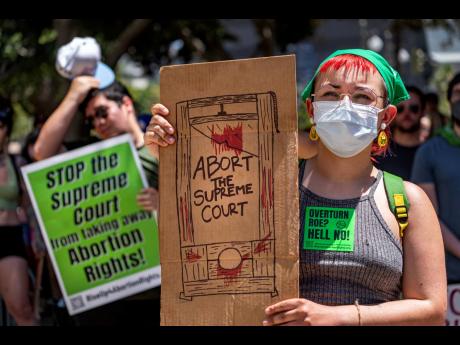Elyssa Koren and Daniel Thomas | Roe v Wade reversal: Victory for democracy and life
The United States Supreme Court has reversed Roe v Wade, ending 50 years under one of the world’s most permissive abortion regimes. The American abortion landscape has been fundamentally altered with the decision in Dobbs v Jackson Women’s Health Organization. As tensions flare, we must consider the international implications of this momentous ruling, with an eye for any potential lessons learned for Jamaica and the Caribbean.
First, in the midst of virulent backlash, it is imperative that we make clear what the Dobbs ruling actually entails. The Supreme Court has recognised the right of each American state to determine its own abortion laws, in accordance with democratic processes. The effect of this is to allow the states to introduce much-needed, common-sense limitations on abortion access. The court has returned the abortion issue to the democratic process, putting an end to decades of an extremist abortion regime that deeply harmed women, children, and all of American society.
Until now, the United States has been one of only five countries – including China and North Korea – that permits abortions to be carried out “on demand” throughout all nine months of pregnancy. It is, in fact, the US that has been radically out of step with the rest of the world, not the other way around.
FAR FROM OVER
According to the United Nations data, the majority of countries prohibit abortion or heavily restrict access to abortion. Dobbs is thus a crucial first move toward allowing the US to realign with majority international practice.
Most important, there is no international right to abortion, and any claims to this effect are nothing more than the clamour of disingenuous activists. The international human rights framework is based fundamentally on respect for all human life, born and unborn. Jamaica is well within its rights to exercise its prerogative to safeguard unborn life, and should focus its efforts on ensuring that every woman has the support that she needs to welcome a child.
The Dobbs decision has made clear that the American abortion debate is far from over. Contrary to what you may hear, only one in three Americans support the extremist abortion landscape put in place under Roe. Very few actually support free and unlimited abortion “on demand”, no exceptions, up until birth.
In spite of the fact that its internal debate is very much ongoing, the US is the primary exporter of the abortion agenda globally, with the Biden administration budgeting US $597 million for “sexual and reproductive health” programmes for 2023 alone. If the abortion question in the US is so far from settled, then why is it harnessing its coercive might to lure other countries into removing protections for unborn life?
Caribbean countries must stand firm in defence of life, and resist any attempts to violate their national sovereignty. After all, the Dobbs decision is a resounding affirmation of the principle of self-determination, and one that should hopefully inspire other countries to hold strong to their national values in the face of foreign interference. This is the only stance befitting a democratic society, and one that ultimately is necessary for the flourishing of all human rights.
NO SMOOTH ROAD
Now, as each American state considers its own laws on abortion, the hope is that it will be informed by the vastly evolving medical and societal research pointing to the humanity of the unborn child. With advancements in modern ultrasounds, we now know that at six weeks, an unborn child has a beating heart, and by 15 weeks unborn children can suck their thumbs, have fully formed noses and lips, eyes and eyebrows. Recent research shows that they may feel pain from 12 weeks, or even earlier.
What is clear is that as the US grapples with its new abortion dynamics, the road will not be smooth. The task of reversing course after decades of abortion extremism will be fraught with deep societal wounds not easily healed. May what has happened in the US be a lesson for all. Jamaica need not follow this reckless path, and the hope is that it will continue to uphold the value of human life, at every stage, without reserve.
Interestingly, a sweeping treaty looms that attempts to take the decision regarding abortion and so much more out of the hands of 79 democratic countries across the world. The Afro-Caribbean-Pacific – European Union Treaty (ACP-EU Treaty) presents one of the most significant contemporary threats to the global legal order, spanning many concerning topics, including abortion, parental rights, same sex marriage and radical comprehensive sexuality education; and is legally binding for 20 years.
Should States have the right to determine protections for their unborn children, or should a few people in the European Parliament determine what happens in countries like Jamaica? The era of dictators has ended – every country must be free to determine what is best for them. This is the fundamental sovereignty upon which the international order is based. In the US, the millions who support the reversal of Roe are standing up for the citizens of one state to make different decisions from those of another. It is this same principle of self-determination that must inform how we approach the issue globally as well.
- Elyssa Koren is legal communications director, Alliance Defending Freedom International and Dr Daniel Thomas is a medical doctor at the Kingston Public Hospital and is president of the Love March Movement.

